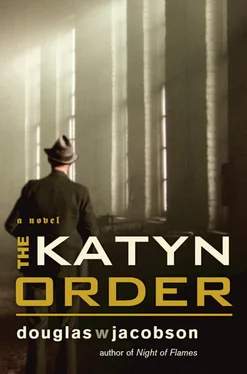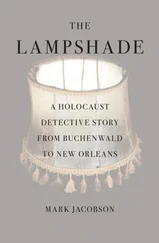Adam breathed a sigh of relief when he saw a truck with the insignia of a janitorial company parked in front of the open dock door. He’d remembered correctly Jastremski’s comment about the dock door only being used on Friday mornings. He turned to Andreyev. “You know what to do?”
The Russian nodded. “I’ll be on Avenue Mickiewicza at the south end of the library in thirty minutes. If you’re not there, I’ll come back here to the loading dock. I’ll repeat the process every fifteen minutes unless…”
Adam nodded. “Yes, I know—unless the NKVD or the police show up.”
“If that happens, I won’t be able to—”
“It won’t happen. Tarnov hasn’t figured it out yet.” Adam got out of the car and watched Andreyev drive off. He reached into the pocket of his suit coat and felt the Browning 9mm pistol Natalia had given him. A part of him hoped Tarnov would show up.
The janitorial truck was empty, and there was no one around at the moment. Adam checked his watch. It was five minutes past ten. With a groan, he climbed onto the loading dock and stepped into the building.
Natalia entered the library at precisely 10:15, noticing only a scattering of people at the tables in the ground floor gallery. She wasn’t surprised. It was Saturday, and it was summer, with the start of the university’s first fall term after the war still a month away. Following Adam’s instructions, she walked past the information desk and headed for the curved, marble stairway leading up to the Reading Room. As she passed the bust of Copernicus in the center of the circular gallery, Natalia glanced to her left. At a table on the far side of the room, Adam sat with his head down, reading a magazine—right where he had said he’d be.
The Reading Room was vacant except for a middle-aged, paunchy man wearing a gray felt cap, who sat at a table near the rear, leaning over an open book as though he was having trouble making out the print. The librarian on duty—a bald, tired-looking man of about fifty—sat behind the counter at the front of the room sorting index cards.
As Natalia approached the counter she silently rehearsed what Adam had instructed her to ask for—the Proceedings of the Academy of German Law, 1935, the conference where Banach first met Hans Frank. It would be a large leather-bound volume, which Adam remembered from his uncle’s personal collection. He was convinced that Banach had hidden the copy of Stalin’s order in the book before leaving Krakow.
Natalia’s mouth was dry, and she felt very exposed, but so far things were proceeding as planned. They had decided she would be the one to ask for the book because, if he were questioned later, the librarian would be less likely to remember her than Adam, who looked like he’d just stepped out of a boxing ring.
When the librarian finally looked up from his index cards, Natalia smiled. “I wonder if you could help me. I’m looking for the proceedings of a legal conference.”
The man set aside the stack of cards. “Well, I will certainly try. What is the name of the organization?”
“The Academy of German Law,” she replied. “The conference was in 1935.”
The man scratched his chin, then walked over to an immense card catalog and pulled open a drawer. He slowly thumbed through some index cards, then slid the drawer closed and opened another. Natalia fidgeted while he repeated the process a third time before finally turning back to the counter, looking pleased with himself and holding up an index card. “I believe I’ve found it,” he announced. “I’ll return in a moment.”
When he disappeared into the stacks, Natalia’s neck began to tingle, and she glanced around the room again. No one was there except the paunchy man hunched over the book. She took a deep breath to calm down and thought about the phrase that Banach wrote in the last page of his journal— pathetic pawns on the perilous chessboard of the NKVD. As a code, it was ingenious. It was a memorable phrase, but Banach knew that Adam was the only person who would connect it to the event where Banach had met Hans Frank before the war—the conference of the Academy of German Law in 1935.
After an excruciatingly long time, the librarian returned and set the book on the counter. It was indeed a thick, leather-bound volume with gold printing on the spine that read:
THE ACADEMY OF GERMAN LAW
PROCEEDINGS OF THE ANNUAL CONFERENCE
14-19 JULY, 1935
“It’s a reference book and not to be checked out,” he said, “but you’re welcome to take a seat and spend as much time as you need.”
Natalia thanked him, gathered up the book and moved to a table near the windows. She sat down with her back to the open room, shielding the book from view. Her palms were sweaty and she wiped them on her trousers, then opened the book and carefully thumbed through the pages.
There! Two sheets of paper folded in thirds and inserted into the middle of the volume. Natalia examined the first one. It was a carbon copy of a document, typewritten in Russian and dated 5 March, 1940. She could make out only a few words, mostly names— J. Stalin, L. Beria, and others she didn’t recognize. A number of signatures were scrawled across the document. She looked around the room a third time, then unfolded the second sheet. It was a translation into Polish in the same precise handwriting she recognized from Ludwik Banach’s journal.
As Natalia read the translation her eyes clouded with tears. It was all there, exactly as Banach had described in his journal—an order, signed by Joseph Stalin and every member of the Soviet Politburo on 5 March, 1940, authorizing the execution of twenty-seven thousand Polish “nationalists and counterrevolutionaries,” including more than four thousand officers of the Polish Army in the Katyn Forest.
She sat for another moment, immobilized, staring at the despicable document with tears trickling down her face. She thought about her brother, Michal, shot in the back of the head, his body lying in a ditch in that Russian forest. The document could not bring him back, and it could never heal the wounds… but at least now there was proof. At least now, after all the pain and the sorrow, after everything that had been taken away, the dark, silent secret would be exposed.
Natalia carefully refolded the two sheets of paper, slipped them into the pocket of the vest she wore under her sweater and returned the book to the counter. As she left the Reading Room, she had the feeling that tomorrow would be a better day.
A quarter of an hour earlier, just after Natalia entered the Copernicus Memorial Library, Rabbit crossed Avenue Mickiewicza and stood on the corner opposite the massive building. He slipped his right hand into his pocket and felt the smooth walnut handle of the knife Karol had given him before they left Nowy Targ. It was a risk, of course. If he were stopped and searched, being armed was an immediate death sentence. But he didn’t intend to be searched.
He pulled out the pack of cigarettes Adam had also given him, leaned against the side of the building and lit one. Adam had said it would make him appear more casual. Rabbit was feeling a lot of things right now, but casual wasn’t one of them.
He thought about Natalia and Adam —the Conductor and Wolf— in the library risking their lives for a piece of paper. They had real names, the first people he’d known in a long time who did. Natalia had asked his name the other morning as they sat by the river, the morning she told him what was really going on. But he didn’t have another name to give her, at least not one he wanted to remember. He was Rabbit. He’d been Rabbit since he was eight years old and woke up in the middle of the night surrounded by smoke and flames, his parents lying dead under a heap of rubble in their parlor. He and his brother had run out of the house and into the streets crowded with people shrieking and crying. Since then he’d stayed alive for six years by running fast… and he didn’t need another name.
Читать дальше












